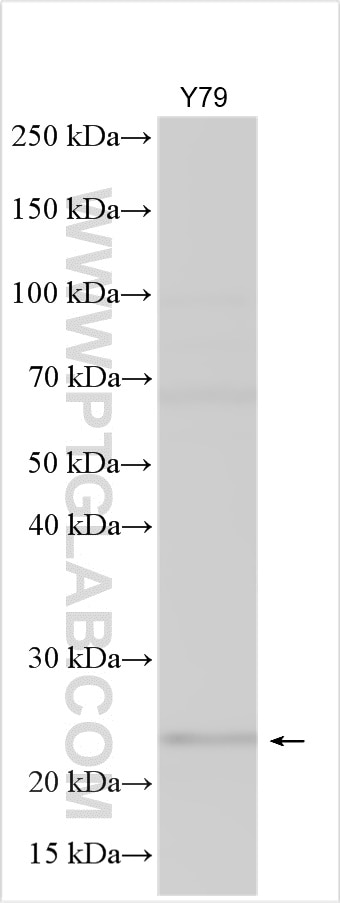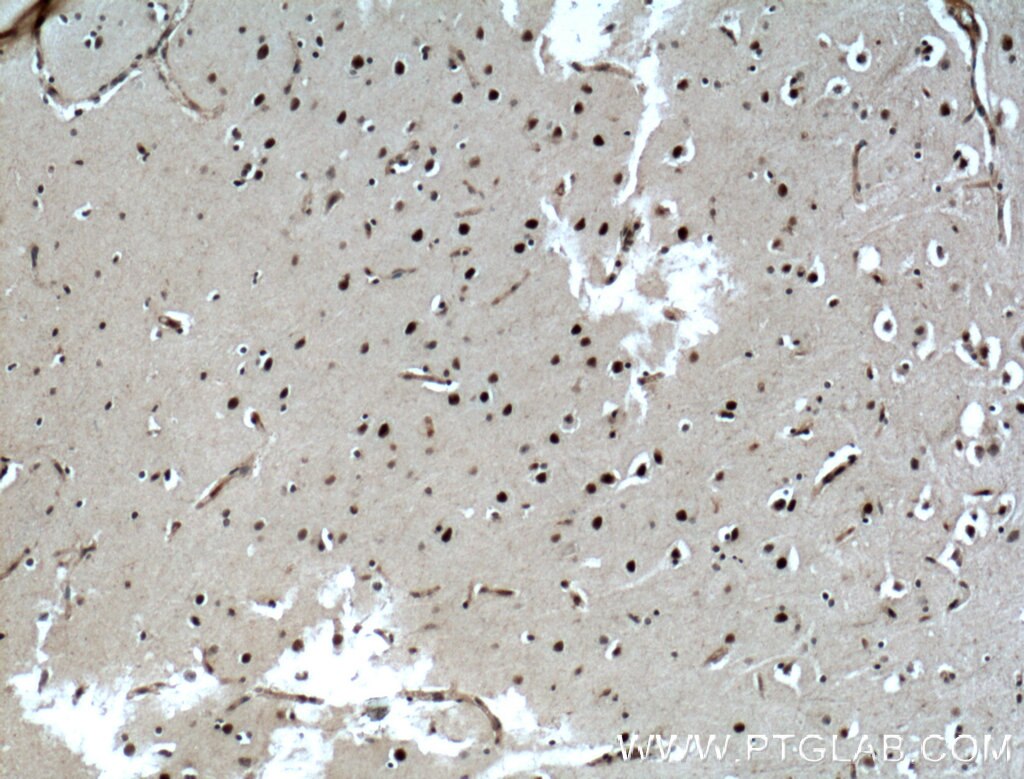Anticorps Polyclonal de lapin anti-ASCL1
ASCL1 Polyclonal Antibody for WB, IHC, ELISA
Hôte / Isotype
Lapin / IgG
Réactivité testée
Humain
Applications
WB, IHC, ELISA
Conjugaison
Non conjugué
N° de cat : 23751-1-AP
Synonymes
Galerie de données de validation
Applications testées
| Résultats positifs en WB | cellules Y79, |
| Résultats positifs en IHC | tissu cérébral humain, il est suggéré de démasquer l'antigène avec un tampon de TE buffer pH 9.0; (*) À défaut, 'le démasquage de l'antigène peut être 'effectué avec un tampon citrate pH 6,0. |
Dilution recommandée
| Application | Dilution |
|---|---|
| Western Blot (WB) | WB : 1:500-1:1000 |
| Immunohistochimie (IHC) | IHC : 1:50-1:500 |
| It is recommended that this reagent should be titrated in each testing system to obtain optimal results. | |
| Sample-dependent, check data in validation data gallery | |
Applications publiées
| IHC | See 3 publications below |
Informations sur le produit
23751-1-AP cible ASCL1 dans les applications de WB, IHC, ELISA et montre une réactivité avec des échantillons Humain
| Réactivité | Humain |
| Réactivité citée | Humain |
| Hôte / Isotype | Lapin / IgG |
| Clonalité | Polyclonal |
| Type | Anticorps |
| Immunogène | ASCL1 Protéine recombinante Ag19360 |
| Nom complet | achaete-scute complex homolog 1 (Drosophila) |
| Masse moléculaire calculée | 25 kDa |
| Poids moléculaire observé | 25 kDa |
| Numéro d’acquisition GenBank | BC003134 |
| Symbole du gène | ASCL1 |
| Identification du gène (NCBI) | 429 |
| Conjugaison | Non conjugué |
| Forme | Liquide |
| Méthode de purification | Purifié par affinité contre l'antigène |
| Tampon de stockage | PBS with 0.02% sodium azide and 50% glycerol |
| Conditions de stockage | Stocker à -20°C. Stable pendant un an après l'expédition. L'aliquotage n'est pas nécessaire pour le stockage à -20oC Les 20ul contiennent 0,1% de BSA. |
Informations générales
This gene encodes a member of the basic helix-loop-helix (BHLH) family of transcription factors. The protein activates transcription by binding to the E box (5'-CANNTG-3'). Dimerization with other BHLH proteins is required for efficient DNA binding. This protein plays a role in neuronal commitment and differentiation and in the generation of olfactory and autonomic neurons. Mutations in this gene may contribute to the congenital central hypoventilation syndrome (CCHS) phenotype in rare cases.
Protocole
| Product Specific Protocols | |
|---|---|
| WB protocol for ASCL1 antibody 23751-1-AP | Download protocol |
| IHC protocol for ASCL1 antibody 23751-1-AP | Download protocol |
| Standard Protocols | |
|---|---|
| Click here to view our Standard Protocols |
Publications
| Species | Application | Title |
|---|---|---|
Front Immunol New insights into markers for distinguishing neuroendocrine prostate cancer: evidence from single-cell analysis | ||
Pathol Res Pract POU2F3-positive small cell carcinoma of the bladder: A clinicopathologic analysis of 4 cases and literature review | ||
Lung Cancer The molecular subtypes of small cell lung cancer defined by key transcription factors and their clinical significance |



